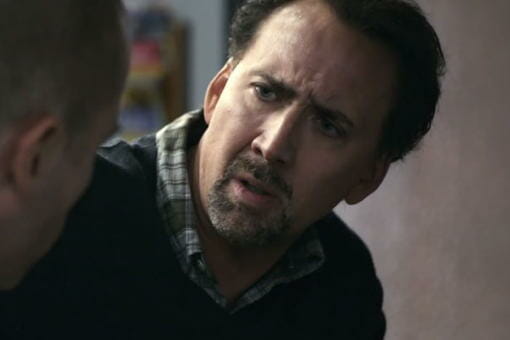By Pam Glazier · March 5, 2012

Sometimes, as a movie reviewer, you come up against a film that simply baffles. It’s not like a Bergman film or a Lynch film where you’re supposed to be baffled and then discuss the deep symbolism of it all. No, the sorts of movies I’m talking about leave you feeling, after you’ve finished watching them, like you’ve been trying to build a house using M.C. Escher blueprints. You try and understand what the writer was going for, why the director chose that shot, etc. Long story short, you wonder why these movies give off the sense that those responsible for them seem to have been sniffing glue. Seeking Justice is one of these films.
But the weird part is, I liked it.
Nicholas Cage plays high school English teacher Will Gerard. Will wishes he could get through to these kids with some Shakespeare, but the metal detectors and graffiti visually explain to us that he’s going to have a difficult time in this. He is married to the lovely Laura Gerard (January Jones), a cellist in the New Orleans symphony. The beginning of the film sets up their careers and also that they go out and socialize with their work buddies in the vibrant culture of the New Orleans night life. They drink, they laugh, they dance like horrible old white people—and this goes on for such a long time that you start wonder what the hell is going on.
You begin to notice that the camera is tilted mildly askew and sort of hovers in and out. You start to notice, here and there, that a scene sort of begins suddenly and then stays a little too long. These two things interplay against one another and it’s off-putting. You find yourself wondering if the cinematographer was high, or just overly artistic. My best guess is that a little bit of both went into this particular style, and I think that even though it’s not what I’m used to, it was refreshing because it put me off my balance and therefore kept me interested.
The writing also follows this kind of style. It feels like you’re headed down a predictable path that you would expect, but then it twists away from you. Not in a cool “I meant to do that” kind of twist; but in a vague “I forgot where I was” kind of wandering twist. It’s a really strange feeling. I think you should watch this thing just to feel the weird bafflingness—even if you hate Nicholas Cage or Action Thrillers in general.
The overly long intro to this film seems unending until Blam! lovely cellist Laura gets brutally raped while Will is randomly at a chess bar with a work buddy. And then Blam! some random guy at the hospital is like “If you agree to give us a favor, we’ll kill the bastard. Just buy two chocolate bars in the vending machine to confirm.” Right? What the hell? That’s a pretty random choice for confirming that you’re putting out a hit on somebody—but MAN does it make for one tense vending machine moment! What’s even crazier is that the rapist is murdered super-quick, and then another random dude delivers confirmation photos to Will—seemingly within hours of the vending machine situation!
So now that the entire “get the rapist” arc has been neatly wrapped up in less than five minutes, the movie goes back to Will and Laura dealing with the aftereffects of a serious trauma. They are finally almost back on track when Will gets a phone call: the mysterious group needs a favor.
Beh… I’ll stop describing the plot, but as you can see from the examples above, this movie is a conglomerate morass of various films squeezed together—the inner city teacher trying to make a difference, the married couple trying to survive the aftermath of a trauma, the everyman against a mysterious shadow group, etc. And because of that, things get dropped from the plot lines of each narrative respectively in an attempt to make it all fit. The encouragement and meaningful looks Will shares with a student come to nothing, and neither does the fact that he punched a student during a moment of high stress. Isn’t it usual to get worse than 3 weeks suspension when you PUNCH A FREAKING STUDENT IN THE FACE?!
Either way, these plot elements are left unsatisfied so that they could include more unsatisfied plot elements from the other incomplete narrative arcs. In one shot there’s a prominently featured mysterious grey car that ends up not having any relevance to anything. Then there’s the close up shot of the cell phone that Will loses in a chase scene, but the fact that he loses his phone means nothing (as it is not brought up again).
And then there’s awkward exposition squeezed in for lack time, this one was my favorite: “She’s just in the abandoned mall next door, let’s go see her.” And yes, then they proceed to traipse next door right into a giant abandoned shopping mall. Again, random.
So this story had problems, and so did its execution. But I still liked it. I thought Nicholas Cage was in decent form, the other actors did a good job, and the weird cinematography and late lingering scenes provided a strange take on a standard theme. It captivated me more than Bangkok Dangerous did but less than ConAir. And at the very least, it’s better than Ghost Rider 2. Go and catch it if you can.